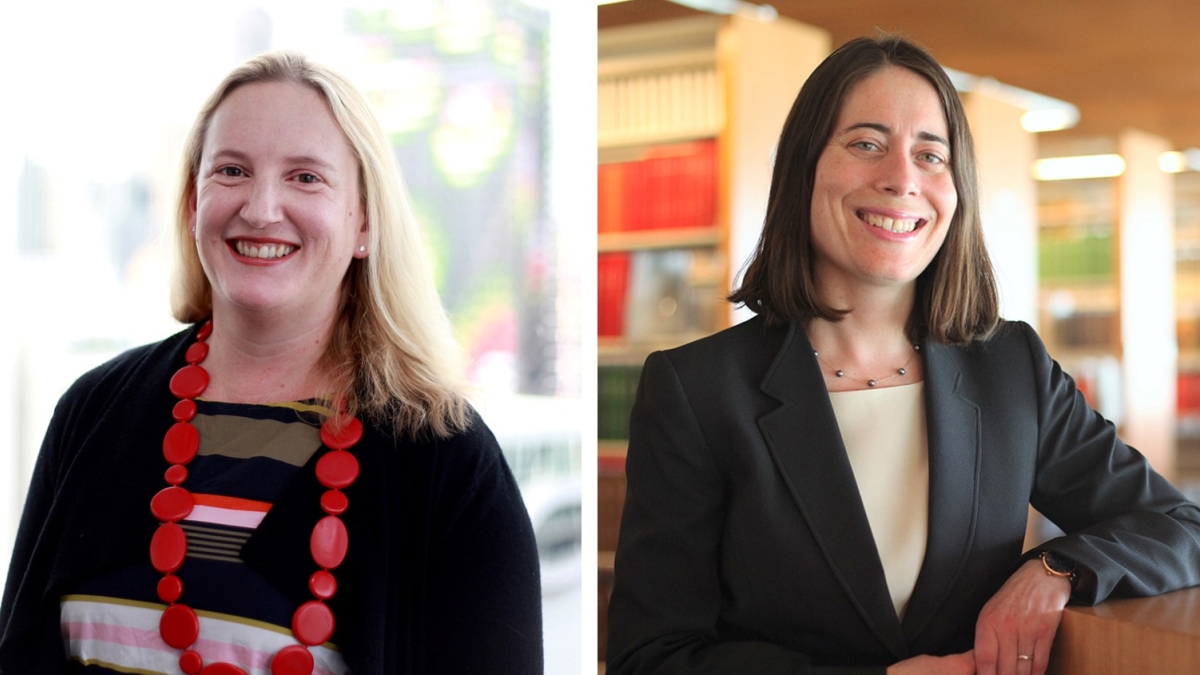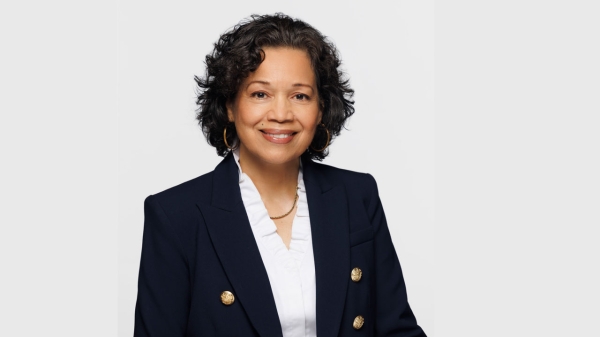A road map for climate-change policy
ASU's Morrison Prize awarded to authors navigating rocky terrain of partisan politics

Morrison Prize co-winners Jacqueline Peel, associate dean of the master's program at the University of Melbourne Law School in Melbourne, Australia, and Hari M. Osofsky, dean of Penn State Law and the Penn State School of International Affairs.
Even with widespread agreement that the world’s climate is rapidly changing, the United States has struggled to combat the issue, hindered by divisive partisanship. Is there an effective path forward for a nation so torn ideologically?
Hari M. Osofsky and Jacqueline Peel believe there is. And they have been awarded this year’s Morrison Prize for their academic article, “Energy Partisanship,” which not only outlines the critical importance of bridging and circumventing the partisan divide, but also provides guidance for doing so.
The Morrison Prize, established in 2015, is administered through the program on law and sustainability at the Sandra Day O’Connor College of Law at Arizona State University. The annual contest awards a $10,000 prize to the author of the most impactful sustainability-related legal academic article published in North America during the previous year. The prize is named after its funder, Richard N. Morrison, who is also a co-founder of the Morrison Institute for Public Policy at ASU.
“We’re both honored and humbled to have our work recognized with this year’s Morrison Prize, especially given the remarkable scholarship honored with this award in past years,” Osofsky said. “Arizona State University helps to advance sustainability in needed ways by providing this opportunity for those writing in the field."
Osofsky, who co-authored the article as a professor at the University of Minnesota Law School, now serves as the dean of Penn State Law and the Penn State School of International Affairs. Peel is associate dean of the Masters program at the University of Melbourne Law School in Melbourne, Australia. And she says the political challenges hindering climate policy are not unique to the U.S.
“Partisanship is not just a challenge for energy and climate policy in the United States but more broadly for Western democracies, including my own,” Peel said. “Our article suggests that strategies of energy pragmatism are the best answers to energy partisanship.”
Bypassing the partisan roadblocks
“Energy Partisanship,” which was published in the Emory Law Journal, details how vitriol in American politics has impeded progress on climate policy. While Republicans, for example, allege Democrats are waging a “war on coal,” Democrats denounce Republicans as belonging to a “flat-Earth society.” Politicians play to their base, using sound bites and name-calling — and even the occasional stunt.
The article recounts how in 2015, Sen. James Inhofe, R-Okla., signed off on legislation that declared “climate change is real and not a hoax.” The landmark bipartisan measure had only one dissenting vote. Still, Inhofe later stated, “The hoax is that there are some people that are so arrogant to think that they are so powerful that they can change climate. Man can’t change climate.”
A few weeks later, in an attempt to illustrate his point, Inhofe threw a large snowball on the Senate floor, and made a statement directed at then-President Barack Obama: “You know what this is? It’s a snowball … just from outside here, so it’s very, very cold out. Very unseasonal. So, Mr. President, catch this.”
The reaction to Inhofe’s snowball throw was predictably partisan, viewed as either a salient point well made or a ridiculous act of showmanship that proved nothing.
Could Inhofe have swayed his opponents with a stronger scientific argument? Perhaps not. As the paper states, “an emerging body of psychological research indicates that these differences cannot be overcome simply by presenting politicians and the public with more and better scientific data; strongly divided partisan views are difficult to shift and not responsive to change in the face of expert opinion.”
Opinions are difficult, if not impossible, to change on climate change. And those partisan disagreements, as the paper points out, “constrain possibilities not only for U.S. legislative efforts but also for international ones.”
So what can be done?
Drawing on case studies and empirical data, Osofsky and Peel have identified specific strategies for overcoming partisanship and making greater progress in the area of energy sustainability. Specifically, they suggest looking beyond the legislative branch of the federal government, where consensus seems especially elusive. Among the suggestions:
- seeking smaller-scale changes through state or local governments
- bypassing legislatures through litigation or executive authority
- creating incentives for the private sector to address energy issues
- placing a stronger focus on topics within the climate-change discussion where greater consensus may be possible, such as economic development and disaster resilience
“At this moment of political polarization, we hope that our work on energy partisanship can assist efforts to encourage greater bipartisan collaboration and constructive dialogue across difference in energy and climate-change law and policy,” Osofsky said. “The Morrison Prize provides important support for our efforts to do so.”
About the Morrison Prize
Professor Troy Rule, director of the Law and Sustainability Program at ASU Law, says sustainability efforts are focused heavily on science and technology, which is important. But political challenges are often overlooked.
“Tens of billions of dollars are expended every year on hard science research aimed at promoting environmental sustainability,” Rule said. “This hard science research is producing powerful technological breakthroughs, some of which could dramatically improve environmental sustainability on this planet. Unfortunately, relatively few research dollars or scholarly efforts are devoted to overcoming the legal and policy obstacles that are impeding humanity’s adoption of these technologies.”
The Morrison Prize is intended to help close that gap.
“Humankind increasingly needs innovative legal constructs and policies capable of supporting and facilitating its growing array of sustainability-oriented technologies,” Rule said. “By encouraging and recognizing impactful sustainability-related legal academic research, the Morrison Prize seeks to help drive the legal and policy innovation that’s critical to the advancement of the sustainability movement.”
Each year, law professors from around the world who have recently published articles in North American legal academic journals are eligible to enter the contest. All entries undergo independent review and scoring by a diverse group of full-time law professors who teach in environmental sustainability-related areas at various North American law schools. The scores from these judges are aggregated to determine the prize winner.
Osofsky and Peel, the third winners of the Morrison Prize, will be honored in person May 11 in Phoenix at the fourth annual Sustainability Conference of American Legal Educators.
“This award is particularly meaningful to us because it’s based on impact,” Osofsky said. “As legal scholars, it’s always our hope that our work will make a positive impact in academia and beyond, and to be recognized for doing so is very rewarding.”
In 2017, Vanderbilt University professors Michael P. Vandenbergh and Jonathan Gilligan won the prize for "Beyond Gridlock." The article underscored the difficulties of effecting change through government and highlighted the underutilized potential to reduce greenhouse-gas emissions through the private sector.
In 2016, Dave Owen, a professor at University of California, Hastings College of Law, and Colin Aspe, a freshwater conservation adviser at the Nature Conservancy, were the inaugural winners of the Morrison Prize. Their article, “Trading Dams,” described creative new policy approaches for better balancing hydroelectric energy generation and environmental protection on the nation’s river system.
More Law, journalism and politics

CBS News president to give keynote address at Cronkite School’s spring convocation
Ingrid Ciprián-Matthews, president of CBS News, will serve as the keynote speaker at Arizona State University’s Walter Cronkite…

School of Politics and Global Studies director's new book explores mass violence
Why do people commit atrocities and why are certain groups, including religious and ethnic, more vulnerable to large-scale…

ASU faculty contributing to improvement of Wikipedia
Many academics have a love-hate relationship with Wikipedia. While the website has information about almost anything you can…